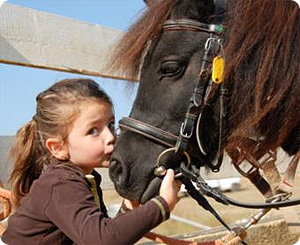HORSE Health Information

HORSE Medicine Information
When providing medicines to your horse, always consult with a local veterinarian to ensure your horse gets the right medicine and dosage.
While most medicines are administered by a veterinarian, you can give your horse oral, liquid medication. To do this, tilt the head of the horse back and pour the medicine into the back of the horses throat. This process is called "drenching."
HORSE Vaccinations
Just like humans, horses need preventative vaccinations to avoid disease. Domesticated horses should be immunized against flu (influenza) and tetanus, with booster shots given each year. To set up an immunization schedule consult with your local veterinarian.
In addition to flu and tetanus shots, show horses or any other type of traveling horse should receive additional immunizations. To set up an immunization schedule, including annual boosters and special needs immunizations, consult with your local veterinarian.
HORSE Emergencies
Horse injuries are not uncommon and, at times, require immediate attention. Always keep a first aid kit nearby in case of such emergencies. An adequate first aid kit should contain scissors, tape, gauze bandages, thermometer, wound powder, antiseptic and disinfectant creams or gels, ice packs, insect repellant, and elastic self-adhering wraps.
Bleeding
Bleeding requires immediate attention. Before trying to clean a wound, you must stop the bleeding first. Apply immediate pressure with a cloth to open wounds until the bleeding stops. Deep wounds that cause gushing blood should be covered with pressure applied immediately and a veterinarians help should be sought as stitches may be necessary. Once the bleeding stops, apply cold water to the wounded area, or use ice packs regularly to prevent swelling.
Once the bleeding is under control the wound should be cleaned and covered with an antiseptic and a clean bandage. Clean bandages and antiseptic should be used regularly until the wound is healed.
Colic
Sudden changes in diet, strange foods, or stress can induce stomach irregularities in horses, called colic. Colic generally causes sharp pain and cramping in the horse causing them to become uneasy and irritated. While some cases of colic will pass through time and some gentle walking, persistent or ongoing cases may require the help of a veterinarian.
| |
Other Categories
HORSE Pet Care
HORSE Health Information
HORSE Diseases
HORSE Foal
HORSE Breeds
HORSE Products
Main Categories
DOGS
CATS
HORSES
BIRDS
RABBITS
HAMSTERS
MICE AND RATS
GUINEA PIGS
FISH
|

